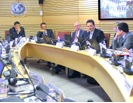In funding and numbers, Australia’s national police force has more than doubled over the past decade. In nature and mission, it is now at the ‘centre of security’ rather than at the core of policing, its own Minister says. Are these changes turning Australia into a police state?
Caption: AFP boss Tony Negus (centre right) at Interpol HQ, France, in June 2010, discussing ‘additional collaboration’ – INTERPOL photo.
Is Australia a police state?
Brendan O’Connor, the Minister for Home Affairs, made a ministerial statement on the Australian Federal Police to the House of Representatives on 16 June 2010. Here are some extracts, with comments:
COST/NUMBERS
Minister O’Connor:
In the last 10 years alone, the AFP’s budget has grown from $302 million dollars and around 2,800 staff, to just over $1.25 billion and around 6,500 staff this financial year. This is expected to grow to 6,700 in the near future.
CLA:
This is an increase of more than 400% in funding, and 240% in numbers. By any measure, compared to the year 2001, Australia appears well on the way to becoming a police state.
TERRORIST ATTACK
Minister O’Connor:
Preventing a terrorist attack on Australian soil remains the highest priority of the Government and the AFP. We have been fortunate that, so far, close cooperation between agencies, shared intelligence and good police work has prevented an attack from taking place.
CLA:
Based on the above government claim of having prevented a tourism attack in Australia, we assume that, if a terrorist attack occurs here, it will represent a lack of close cooperation between agencies, and/or the absence of shared intelligence and good police work.
SHARING SECRET INFORMATION
Minister O’Connor:
The AFP is working on a significant project to deliver secure networks to store and share Secret and Top Secret information across the organisation and with other national security agencies, quickly and easily. This will ensure better coordinated investigations and lay a foundation for more sophisticated capabilities in the future.
CLA:
Given the intrusive nature of current laws, devices and spy systems in relation to the Australian people, the threat by the government of “more sophisticated capabilities in the future” is extremely worrying.
SNIFFER DOGS
Minister O’Connor:
In 2010-11 Budget, the Government announced a further $17.8m over four years to be invested in additional Firearms and Explosive Detection Dogs and AFP handlers at Australia’s 8 major international airports – an increase in capacity of 50%.
CLA:
Drug sniffer dogs have been shown, by a detailed study by the NSW Ombudsman’s office, to be wrong about 70% of the time. Why would anyone put faith in sniffer dogs with such an appalling record, unless it was for public relations purposes? The new airport recruits appear to be the world’s most expensive dogs.
FORCE’S ROLE CHANGE
Minister O’Connor:
International peace keeping and capacity building has also become a core element of the AFP’s role. The range of Australian initiatives which require a policing contribution has also grown. AFP members now undertake duties in conflict zones where armed forces operate and government institutions are weak. The AFP also provides training and mentoring to police in developing nations. This includes high risk missions such as Afghanistan, Timor Leste and Papua New Guinea.
CLA:
By this statement, the government acknowledges that the “Australian” “Federal” Police are in fact supra-Australian, beyond-Federal, and the fourth armed force (in addition to Army, Navy, Air Force) operating inside and outside Australia
RAPID-CRISIS FORCE
Minister O’Connor:
By establishing a standing capability to deploy professional and well trained officers rapidly at times of immediate crisis, the AFP is able to contribute to pre and post-conflict capacity building in the region.
CLA:
The AFP has grown beyond a police force into something else: a fourth, armed column in Australia…there has been no consultation with the Australian people over this change, no national debate, and no consideration of a changed role by the Australian Parliament.
POLICE = SECURITY
Minister O’Connor:
With its own permanent headquarters for the first time in its 30 year history soon to become operational, the AFP has come of age. The move to the Edmund Barton Building brings the AFP appropriately near to its partner agencies in the centre of Canberra’s Parliamentary triangle. It is a fitting location for an organisation that is now very much at the centre of Australia’s law enforcement and national security architecture.
CLA:
Precisely, Mr O’Connor. You describe the dangerous escalation of the role of the AFP in appropriately vivid terms. A federal ‘policing’ body has become an armed, military-style, rapid deployment body operating as a core security agency. What will be its next progression? Does Australia now need a national police force?
ENDS
– Mr O’Connor’s comments are from his Ministerial Statement to the House of Representatives, 16 June 2010, on the Australian Federal Police,
http://www.aph.gov.au/hansard/reps/dailys/dr160610.pdf
(see page 56 and subsequently)


 Is Australia a police state?
Is Australia a police state?